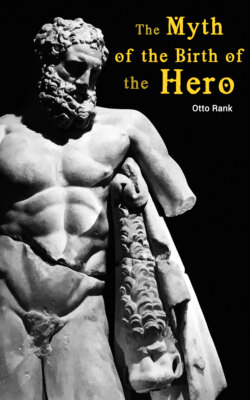Читать книгу The Myth of the Birth of the Hero - Ранк Отто - Страница 7
На сайте Литреса книга снята с продажи.
Œdipus
ОглавлениеTable of Contents
The parents of Œdipus, King Laios and his queen, Jocaste, lived for a long time in childless wedlock. Laios, who is longing for an heir, asks the Delphic Apollo for advice. The oracle answers that he may have a son if he so desires; but fate has ordained that his own son will kill him. Fearing the fulfilment of the oracle, Laios refrains from conjugal relations, but being intoxicated one day, he nevertheless procreates a son, whom he causes to be exposed in the river Kithairon, barely three days after his birth. In order to be quite sure that the child will perish, Laios orders his ankles to be pierced. According to the account of Sophocles, which is not the oldest, however, the shepherd who has been intrusted with the exposure, surrenders the boy to a shepherd of King Polybos, of Corinth, at whose court he is brought up, according to the universal statement. Others say that the boy was exposed in a box on the sea, and was taken from the water by Periböa, the wife of King Polybos, as she was rinsing her clothes by the shore.36 Polybos brought him up as his own son.
Œdipus, on hearing accidentally that he is a foundling, asks the Delphian oracle for his own parents, but receives the prophecy that he will kill his father and marry his mother. In the belief that this prophecy refers to his foster parents, he flees from Corinth to Thebes, but on the way unwittingly kills his father Laios. By solving a riddle, he frees the City from the plague of the Sphinx, a man-devouring monster, and in reward is given the hand of Jocaste, his mother, as well as the throne of his father. The revelation of these horrors, and the subsequent misfortune of Œdipus, were a favorite subject for spectacular display among the Greek tragedians.
An entire series of Christian legends have been elaborated on the pattern of the Œdipus myth,37 and the summarized contents of the Judas legend may serve as a paradigm of this group. Before his birth, his mother Cyboread, is warned by a dream that she will bear a wicked son, to the ruin of all his people. The parents expose the boy in a box on the sea. The waves cast the child ashore on the Isle of Scariot, where the childless queen finds him, and brings him up as her son. Later on, the royal couple have a son of their own, and the foundling, who feels himself slighted, kills his foster brother. As a fugitive from the country, he takes service at the court of Pilate, who made a confidant of him and placed him above his entire household. In a fight, Judas kills a neighbor, without knowing that he is his father. The widow of the murdered man, namely his own mother, then becomes his wife. After the revelation of these horrors, he repents and seeks the Saviour, who receives him among his apostles. His betrayal of Jesus is known from the Gospel.
The legend of St. Gregory on the Stone—the subject of the narrative of Hartmann von Aue—represents a more complicated type of this mythical cycle. Gregory, the child of the incestuous union of royal lovers, is exposed by his mother in a box on the sea, saved and raised by fishermen, and is then educated in a convent for the church. But he prefers the life of a knight, is victorious in combats, and in reward is given the hand of the princess, his mother. After the discovery of the incest, Gregory does penance for seventeen years, on a rock in the midst of the sea, and he is finally made the Pope, at the command of God. (Compare Cholevicas, “History of German Poetry, According to the Antique Elements.”)
A very similar legend is the Iranese legend of King Dârâb, told by King Firdusi in the Book of Kings, and rendered by Spiegel (Eranische Altertumskunde, II, 584). The last Kirânian Behmen nominated as his successor his daughter and simultaneous wife Humâi; so that his son Sâsân was grieved and withdrew into solitude. A short time after the death of her husband, Humâi gave birth to a son, whom she resolved to expose. He was placed in a box, which was put into the Euphrates, and drifted down stream, until it was held up by a stone, which had been placed in the water by a tanner. The box with the child was found by him, and he carried the boy to his wife, who had recently lost her own child. The couple agreed to raise the foundling, and as the boy grew up, he soon became so strong that the other children were unable to resist him. He did not care for the work of his father, but learned to be a warrior. His foster mother was forced by him to reveal the secret of his origin, and he joined the army which Humâi was then sending out to fight the king of Rûm. Her attention being called to him by his bravery, Humâi readily recognized him as her son, and named him her successor.
